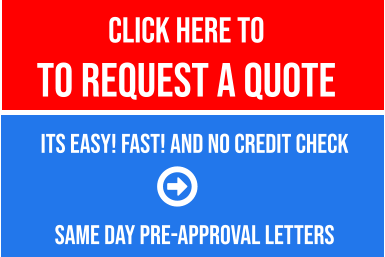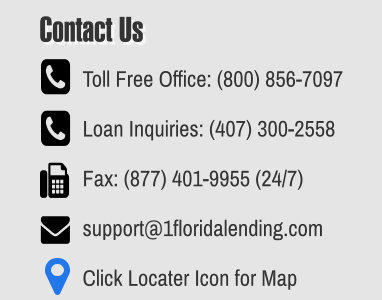







1st Florida Lending Corp., a registered Mortgage Lender
Orlando servicing only the State of Florida, offering over
48 loans programs including Conventional Loans, Non-
Conforming Loans, FHA Loans, VA Loans, USDA Loan,
Self-Employed Loans, Bank Statement Loans, No-Doc
Loans, Reverse Mortgage Loans, ITIN Loans, Rental
Investment Loans, to name a few and specializing in
Bank Statement Loans or “stated loans” requiring no Tax
Return verification and much more. * No broker or
lender fees are for FHA,VA, USDA and Conventional
loan types
Main Office: 2151 Consulate Dr. * Suite 8 * Orlando,
FL., 32837 * Telephone * (800)856-7097 * (800) 655-
1345 * (407) 300-2558 * Fax (877) 401-9955
* Disclaimer: All Loan programs, rates and terms can
change without notice and are subject to credit and
underwriting approval. Loan charts highlight min/max
constraints, assumptions & random scenarios only. We will
always work hard to approve your loan but there are no
guarantees of any kind expressed or implied that any loan
we be approved. Licensed in Florida Only. When Banks
Say No ! We Say YES ! ® is a registered trademark owned
by 1st Florida Lending Corp. Florida lender license #
MLD106.
© 2007 - 2025 1st Florida Lending Corp. - All rights reserved
Refinancing Your Mortgage


Mortgage refinancing can help
you change your loan terms or
put home equity to work.
Refinancing your mortgage is replacing your
current mortgage with a new one. The new loan
pays off the old mortgage and you’ll start making
payments on the new mortgage. You can
refinance your mortgage for all sorts of reasons
including lowering their monthly payment, getting
a better interest rate, taking cash out of their
home, shortening their loan term, or a
combination of the above.
Borrowers with perfect credit
For borrowers with a perfect credit history,
refinancing can be a good way to convert a
variable loan rate to a fixed, and obtain a lower
interest rate. Borrowers with less than perfect, or
even bad credit, or too much debt, refinancing can
be risky.
There are three Types Of
Refinance Mortgages
Refinance mortgages come in three varieties —
rate-and-term, cash-out, and cash-in. The
refinance type that’s best for you will depend on
your individual circumstance. Rates vary between
the three types.
Rate-And-Term Refinance
In a rate-and-term refinance, the only terms of the
new loan which differ from the original one are
either the mortgage rate, the loan term, or both.
Loan term is the length of the mortgage. For
example, in a rate-and-term refinance, a
homeowner may refinance from a 30-year fixed
rate mortgage into a 15-year fixed rate mortgage;
or, may refinance from a 30-year fixed rate
mortgage at 6 percent mortgage rate to a new, 30-
year mortgage rate at 4 percent.
With a rate-and-term refinance, a refinancing
homeowner may walk away from closing with
some cash, but not more than $2,000 in cash. A
“No cash out” refinance mortgages allow for
closing costs to be added to the loan balance, so
that the homeowner doesn’t have to pay costs out-
of-pocket.
Cash-Out Refinance
In a cash-out refinance, the refinance mortgage
may optionally feature a lower mortgage rate than
the original home loan; or shorter loan term, such
as moving from a 30-year mortgage to a 15-year
mortgage.
However, the defining characteristic of a cash-out
mortgage is an increase in the amount that’s
borrowed.
With a cash-out refinance, the loan balance of the
new mortgage exceeds than the original mortgage
balance by five percent or more. Because the
homeowners only owes the original amount to the
bank, the “extra” amount is paid as cash at closing,
or, in the case of a debt consolidation refinance,
directed to creditors such as credit card
companies and student loan administrators. Cash-
out mortgages can also be used to consolidate
first and second mortgages when the second
mortgage was not taken at the time of purchase.
Cash-out mortgages represent more risk to a bank
than a rate-and-term refinance mortgage and, as
such, carry more strict approval standards. For
example, a cash-out refinance may be limited to a
lower loan size as compared to a rate-and-term
refinance; or, may require higher credit scores at
the time of application. Most mortgage lenders
will limit the amount of “cash out” in a cash-out
refinance mortgage to $250,000.
Cash-In Refinance
Cash-in refinance mortgages are the opposite of
the cash-out refinance.
With a cash-in refinance, a refinancing homeowner
brings cash to closing in order to pay down the
loan balance and the amount owed to the bank.
The cash-in mortgage refinance may result in a
lower mortgage rate, a shorter loan term, or both.
There are several reasons why homeowners opt
for cash-in refinance mortgages. The most
common reason to do a cash-in refinance to get
access to lower mortgage rates which are only
available at lower loan-to-values. Refinance
mortgage rates are often lower at 75% LTV, for
example, as compared to 80% LTV. Another
common reason to cash-in refinance is to cancel
mortgage insurance premium (MIP) payments.
When you pay down your loan to 80% LTV or lower
on a conventional loan, your mortgage insurance
premiums are no longer due. Less Paper Work
Required for Refinances
When you do a mortgage refinance, you are
establishing a brand-new loan with brand-new
terms. Typically, this subjects a refinance applicant
to the same mortgage approval process as with a
purchase mortgage applicant.
In other words, the refinance applicant is
evaluated in three specific areas:
1.
Credit Score and Payment History
2.
Income and Employment History
3.
Retirement Assets and Cash Reserves
Furthermore, also like a purchase, the home being
refinanced is subject to a home appraisal in order
to affirm its current market value. Despite the
similarities, though, borrowers can usually expect
to provide less documentation for a refinance
mortgage as compared to a purchase especially if
you refinance with the same lender.
You will still be asked to provide proof of income
using W-2s and pay stubs; proof of assets via bank
statements; and proof of citizenship or U.S.
residency status. But, you will not be asked to
provide information related to the original transfer
of the home. We can close your refinance
mortgage usually in 21 days
Some Refinances like FHA,USDA
and VA Don’t Require
Verifications
Refinance mortgages typically require the
verification of a borrower’s income, assets, and
credit. However, there are certain refinance
programs for which verifications can be bypassed.
These programs are called “streamlined”
refinances. They’re called streamlined refinances
because their underwriting requirements are
grossly simplified and designed to be speedy.
With a streamline refinance, mortgage lenders
waive large parts of their “typical” refinance
mortgage approval process. Often, home
appraisals are waived, income verifications are
waived, and credit scores verifications are waived.
Different lenders may deploy different overlays for
each of the streamlined programs, but the
programs can be summarized as follows.
The FHA Streamline Refinance
The FHA Streamline Refinance program waives all
verifications and refinance mortgage rates are as
low as with a standard-verification FHA-backed
loan and requires refinancing homeowners to save
five percent or more on their mortgage payment;
and, to show a history of on-time payments to
their lender.
Cash-out refinance mortgages are not allowed
via the FHA Streamline Refinance program.
The VA Streamline Refinance
The VA Streamline Refinance is available to
homeowners with an existing VA-backed
mortgage.
Officially known as the VA Interest Rate Reduction
Refinancing Loan (IRRRL), the VA Streamline
Refinance also waives income, asset, and credit
score verifications. Refinancing VA homeowners
are required to demonstrate that the refinance
mortgage will result in monthly payment savings,
except for homeowners changing to a shorter loan
term, such as from a 30-year mortgage to a 15-
year mortgage; or, from an ARM to a fixed-rate
loan.
Homeowners may not receive cash-out as part of a
VA Streamline Refinance.
USDA Streamline Refinance
The USDA Streamline Refinance Program is
available to homeowners with existing USDA home
loans. USDA loans are loans for homeowners in
rural or suburban areas which allow for up to
100% financing. The USDA Streamline Refinance
Program does not verify income, assets or credit;
and, homeowners using the program to refinance
are limited to 30-year fixed rate mortgages and 15-
year loans. ARMs are not allowed. Cash-out
refinance mortgages are not allowed via the
USDA Streamline Refinance.



TURNED DOWN BY YOUR LENDER? CALL US!

Call 407-300-2558
We offer over 48 loan programs in every
county in the State of Florida as follows;
Alachua County,Baker County,Bay
County,Bradford County,Brevard County,Broward
County,Calhoun County,Charlotte County,Citrus
County,Clay County,Collier County,Columbia
County,DeSoto County,Dixie County,Duval
County,Escambia County,Flagler County,Franklin
County,Gadsden County,Gilchrist County,Glades
County,Gulf County,Hamilton County,Hardee
County,Hendry County,Hernando
County,Highlands County,Hillsborough
County,Holmes County,Indian River
County,Jackson County,Jefferson
County,Lafayette County,Lake County,Lee
County,Leon County,Levy County,Liberty
County,Madison County,Manatee County,Marion
County,Martin County,Miami-Dade
County,Monroe County,Nassau County,Okaloosa
County,Okeechobee County,Orange
County,Osceola County,Palm Beach
County,Pasco County,Pinellas County,Polk
County,Putnam County,Santa Rosa
County,Sarasota County,Seminole County,St.
Johns County,St. Lucie County,Sumter
County,Suwannee County,Taylor County,Union
County,Volusia County,Wakulla County,Walton
County,Washington County














